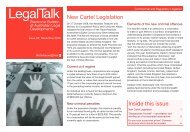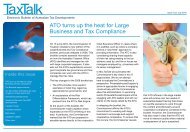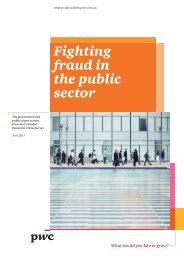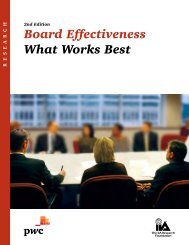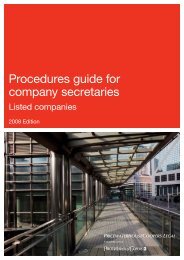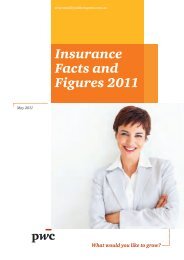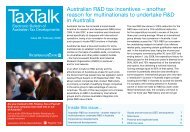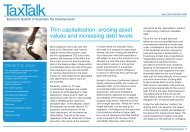How do we rebuild shareholder trust on executive pay
How do we rebuild shareholder trust on executive pay
How do we rebuild shareholder trust on executive pay
Create successful ePaper yourself
Turn your PDF publications into a flip-book with our unique Google optimized e-Paper software.
Being independent<br />
The percepti<strong>on</strong> and the reality<br />
Remunerati<strong>on</strong> committees and their c<strong>on</strong>sultants<br />
have both been charged with lacking independence<br />
from management in the setting of <strong>executive</strong><br />
remunerati<strong>on</strong>. The accusati<strong>on</strong> goes further: that this<br />
leads to an unjustified inflati<strong>on</strong>ary spiral. We believe<br />
that, to the extent that there is a problem, it is not<br />
because of the formal governance rules, which in<br />
our view have been perfectly adequate. Rather, the<br />
focus needs to be <strong>on</strong> behaviour, and how the various<br />
parties including c<strong>on</strong>sultants work together within<br />
the ‘new’ boardroom.<br />
Advice in whose interest?<br />
Remunerati<strong>on</strong> c<strong>on</strong>sultants are being increasingly<br />
blamed for having an inflati<strong>on</strong>ary impact <strong>on</strong><br />
<strong>executive</strong> <strong>pay</strong>. The accusati<strong>on</strong> is that they get hired<br />
by c<strong>on</strong>vincing the CEO he or she is underpaid. They<br />
then persuade remunerati<strong>on</strong> committees to accept<br />
unjustified remunerati<strong>on</strong> packages, before forcing<br />
them <strong>on</strong> unwilling <str<strong>on</strong>g>shareholder</str<strong>on</strong>g>s. Worse still, they use<br />
their skills in achieving high remunerati<strong>on</strong> levels for<br />
the <strong>executive</strong>s to win other lucrative c<strong>on</strong>tracts with<br />
the company. Some parties propose that the <strong>on</strong>ly<br />
way to reduce this potential c<strong>on</strong>flict is for external<br />
remunerati<strong>on</strong> advisers to work solely for the<br />
remunerati<strong>on</strong> committee and to <str<strong>on</strong>g>do</str<strong>on</strong>g> no work<br />
for management.<br />
This analysis would have some validity if<br />
remunerati<strong>on</strong> <str<strong>on</strong>g>we</str<strong>on</strong>g>re set purely <strong>on</strong> the basis of a<br />
c<strong>on</strong>sultant’s recommendati<strong>on</strong>s, using data to which<br />
<strong>on</strong>ly the c<strong>on</strong>sultant was privy, and without checks<br />
and balances. But this is not the reality. With full<br />
disclosure of remunerati<strong>on</strong> for key management<br />
pers<strong>on</strong>nel, a remunerati<strong>on</strong> committee can see the<br />
remunerati<strong>on</strong> of comparators <strong>on</strong> a company-bycompany<br />
basis. Many large companies also disclose<br />
their remunerati<strong>on</strong> structure for the following year.<br />
False predicti<strong>on</strong>s about remunerati<strong>on</strong> trends will<br />
therefore become obvious within a short space<br />
of time.<br />
The important point is that the remunerati<strong>on</strong><br />
c<strong>on</strong>sultant is not giving an opini<strong>on</strong> <strong>on</strong> which<br />
others must rely without access to the underlying<br />
evidence. Instead they are providing data and<br />
ideas to be used as the basis for remunerati<strong>on</strong><br />
committee’s judgement and decisi<strong>on</strong>-making.<br />
The results of those decisi<strong>on</strong>s are then made fully<br />
public to <str<strong>on</strong>g>shareholder</str<strong>on</strong>g>s, who analyse and decide<br />
whether or not to support them. Serious failures of<br />
independence by a remunerati<strong>on</strong> c<strong>on</strong>sultant<br />
would very quickly become public, resulting in<br />
the destructi<strong>on</strong> of that c<strong>on</strong>sultant’s reputati<strong>on</strong><br />
and business.<br />
Be careful what you wish for<br />
But given the importance of <str<strong>on</strong>g>rebuild</str<strong>on</strong>g>ing public <str<strong>on</strong>g>trust</str<strong>on</strong>g><br />
in <strong>executive</strong> remunerati<strong>on</strong>, surely it is better to avoid<br />
even the percepti<strong>on</strong> of a c<strong>on</strong>flict, and to mandate<br />
the use of entirely independent advisers (such as<br />
the route implied within APRA’s latest Prudential<br />
Practice Guide)? We think not, for two reas<strong>on</strong>s:<br />
• Focus <strong>on</strong> this issue would distract from the<br />
areas of <strong>executive</strong> remunerati<strong>on</strong> where change is<br />
genuinely required<br />
• The unintended c<strong>on</strong>sequences of the change in<br />
rules could be worse than the problem it is trying<br />
to solve.<br />
More <strong>on</strong> the first point later. What of the unintended<br />
c<strong>on</strong>sequences?<br />
There are practical c<strong>on</strong>straints. Remunerati<strong>on</strong><br />
advice is becoming increasingly complex. It requires<br />
firms with access to internati<strong>on</strong>al networks of<br />
remunerati<strong>on</strong> advisers; technical skills covering<br />
tax, accounting, legal and valuati<strong>on</strong>s; risk and<br />
performance measurement expertise; stakeholder<br />
communicati<strong>on</strong> skills; and so <strong>on</strong>.<br />
Firms with the scale to support the required<br />
investment in learning, skills, and infrastructure<br />
are unlikely to submit themselves to the<br />
c<strong>on</strong>straint of <strong>on</strong>ly being able to provide advice<br />
to the remunerati<strong>on</strong> committee. This would drive<br />
remunerati<strong>on</strong> committee advice into a boutique<br />
business area, with the inevitable c<strong>on</strong>sequence<br />
that management would then need to appoint<br />
its own adviser in order to access the depth and<br />
breadth of skills required to achieve a rounded<br />
remunerati<strong>on</strong> soluti<strong>on</strong>.<br />
This dual adviser model has the risk of<br />
instituti<strong>on</strong>alising c<strong>on</strong>flict where n<strong>on</strong>e need exist. An<br />
advocacy model can arise, with <strong>on</strong>e adviser batting<br />
for management and the opposing adviser batting<br />
for the remunerati<strong>on</strong> committee. Not <strong>on</strong>ly <str<strong>on</strong>g>do</str<strong>on</strong>g>es this<br />
duplicate costs (which would be particularly <strong>on</strong>erous<br />
for smaller companies), it also reduces the incentive<br />
to achieve a balanced outcome.<br />
As is often the case with changes to governance<br />
rules, the danger is that the <strong>on</strong>ly beneficiaries are<br />
the professi<strong>on</strong>al advisers for whom additi<strong>on</strong>al fees<br />
are generated.<br />
PricewaterhouseCoopers Executive Remunerati<strong>on</strong> – Fourth Editi<strong>on</strong> 2010 | 33




